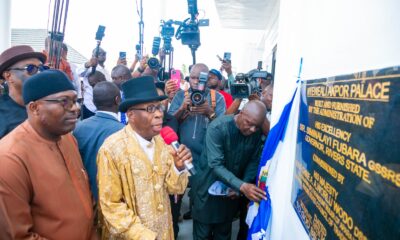Business
Implement Maputo Declaration On Agric, Group Urges FG
The Association of Small-Scale Agro-Producers in Nigeria (ASSAPIN) has appealed to the Federal Government to implement the provisions of the Maputo Declaration on the agricultural sector.
The National President of the association, Hajia Amina Jibrin, made the appeal at the inauguration of the association on Friday in Abuja.
The Maputo Declaration, signed by African leaders in 2003, recommends that individual government should allocate 10 percent of its annual national budget to the agricultural sector to enhance its growth and development.
Jibrin noted that the commitment was also reaffirmed in the 2010 Abuja Declaration, explaining that the idea was to develop a strong agricultural base to ensure food security on the continent.
She noted with regret that from the 12 percent allocated to the sector in 2009, Nigeria backtracked to 3.7 percent in 2010, adding that the development had revealed government’s failure to accord the sector priority attention.
Jibrin urged the federal and state governments to establish agencies for the small-scale agro-producers sector to foster rapid agricultural development.
She also urged the government to lead the way in facilitating agricultural investment, by investing in the provision of accessible extension services to small-scale farmers across the country.
Jibrin reminded small-scale farmers of the need to form associations so as to engage “strategically and constructively” with government in order to benefit from its programmes and initiatives that were aimed at improving their livelihood.
Sen. Gbenga Babalola, the Deputy Chairman, Senate Committee on Agriculture, said the committee would support the association through the evolvement of necessary legislative framework.
“ The small-scale farmers are the people feeding the nation; their capacity needs to be developed.
“The small-scale farmers should also focus on women, because they represent 70 per cent of local and rural farmers who are the backbone of the nation. All they need are good structures on ground to tackle their challenges,’’ he said.
Babalola challenged the association to monitor and follow up on government’s spending on the agricultural sector to ensure that budgetary allocations were judiciously deployed for the achievement of specific objectives.
He declared: “We cannot put 10 per cent of budgetary allocations where it will not be used for the purpose it is meant, and at the end of the day, we are back to square one.
“The objective is not only about allocating money, but where it is going to. We need to create the appropriate capacity to be able to monitor the money to ensure that it is put where it belongs.”
Business
Abolish Multiple Taxation In Rivers, Group Urges Govt
Business
MDAs, Presidency Spend N1.9bn On Trips, Trainings In France
Business
NCDMB, ARPHL, Others Partner On Refinery Project
-
Opinion3 days ago
Drunken Captains Of A Sinking Ship
-
News3 days ago
Fubara Recommits To Wellbeing Of Rivers People
-
Business3 days ago
Firm Advocates For Renewable Energy Adoption
-

 Entertainment3 days ago
Entertainment3 days agoInternational Women’s Rights Day: Alliance Française Port Harcourt Celebrates The ‘Badass’ Heroines
-
Business3 days ago
MTN Partners Automobile Firm Local Content Promotion
-
Politics3 days ago
Court Adjourns Natasha’s Suit Against Senate To March 25
-

 News3 days ago
News3 days agoFubara Urges Rivers People To Remain Peaceful, Law-abiding …As Eze Worlu-Wodo Inaugurates Palace For Akpor Kingdom
-
Business3 days ago
Firm’s Retirees Seek Special Consideration In N758bn Pension Fund

